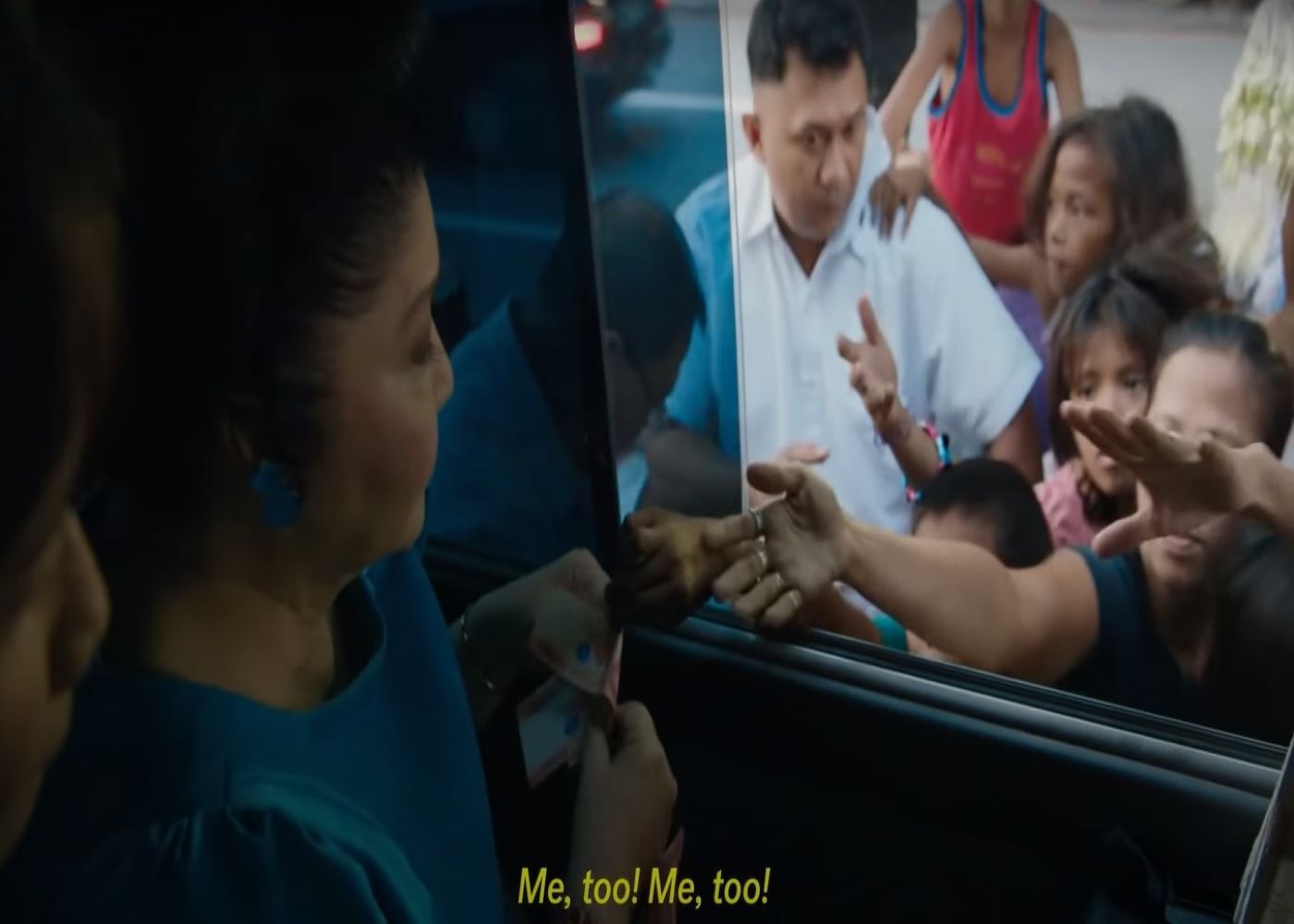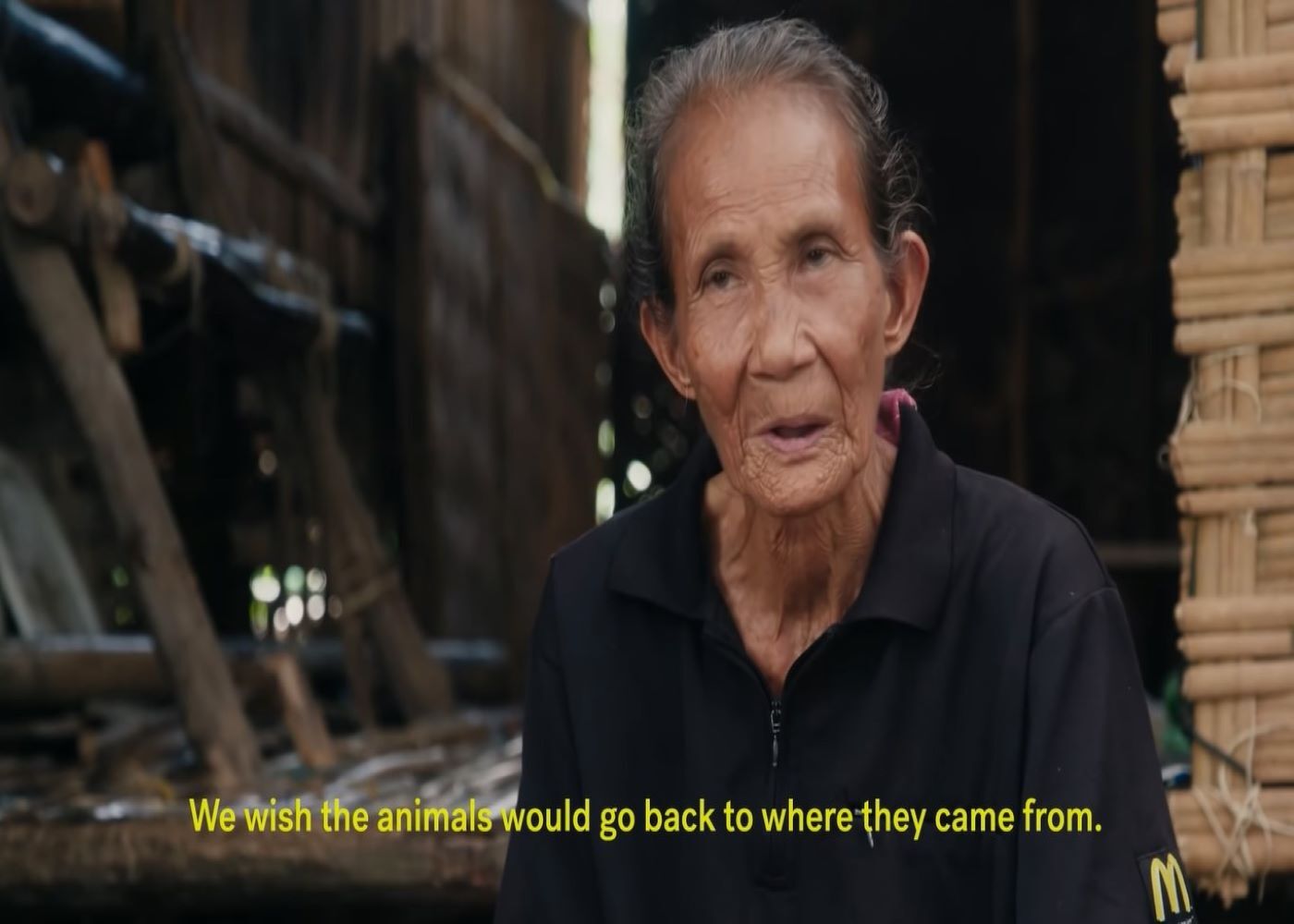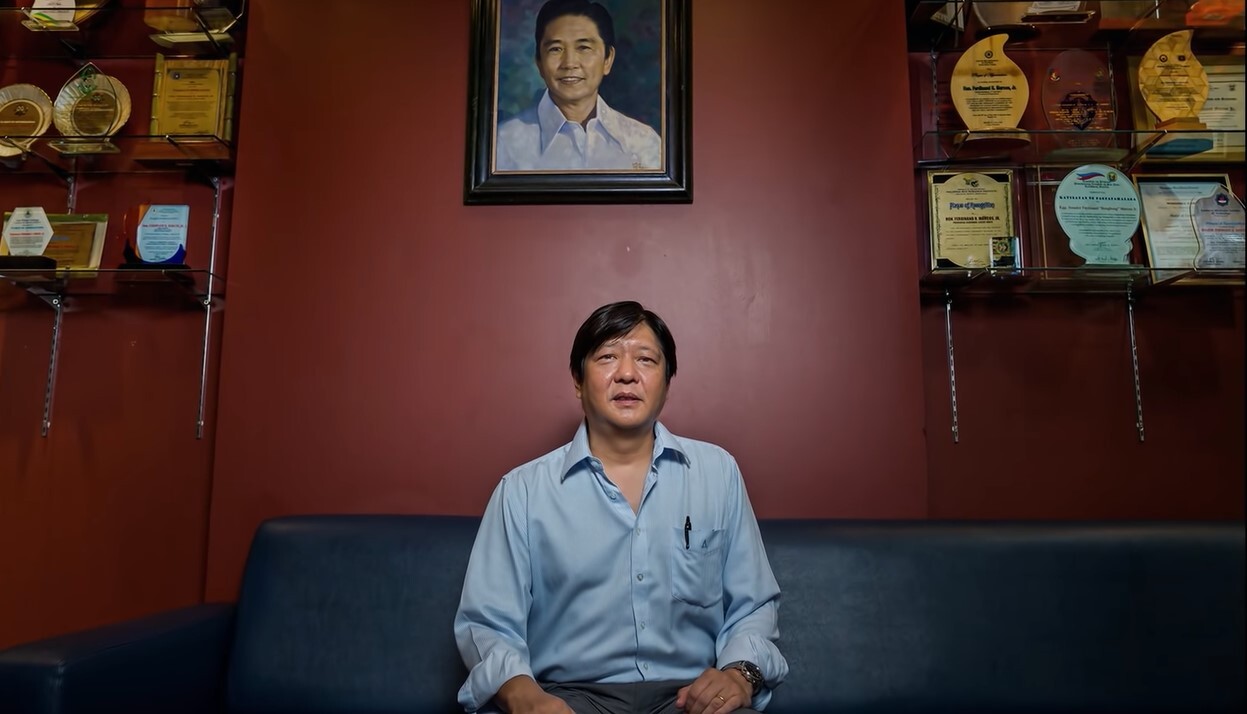'The Kingmaker' Review: The Delusions and Megalomania of Imelda Marcos
You could almost say it’s a horror movie, except it isn’t. It is far worse, for there are no cuts nor takes here, no paid actors, and no divesting of roles when the shoot ends and the credits roll. It is a true story, indeed, one that begins as a portrait of an unreliable figure desperate to tell her own version of the story – and whose delusions of grandeur are at once contemptible and nauseating. The horror is Imelda Marcos.
In the first minute of Lauren Greenfield's documentary "The Kingmaker," we see Imelda with her coiffed hair, face unmoving as if she is wax herself, sitting matronly inside her van as they drive through Manila. In a moment, one of her aides opens the window and Imelda begins handing out crisp P50 bills to the needy. Soon she is swarmed by them, their arms outstretched as they clamor for money.
"When I see Manila, I feel so depressed and sad. This was a little paradise," she remarks. "Before, during my time, there were no beggars. I had a place for them."

The Shoes as Distraction

Imelda is probably most known for her thousands of shoes. For all the things that she had done and was notorious for, for some reason it was the shoes that stuck. Perhaps it’s because the image of thousands of shoes all lined up offers better memorability. But there’s a problem here if the worst thing Imelda is known for is her vanity, or if the first thing that comes to mind at the mere mention of her is shoes.
Greenfield, in an interview with Vox, shared that Andy Bautista, former head of the Philippine Commission on Good Governance, had been saying that the shoes are a distraction.
“[I]n a way, I think that’s a powerful idea, because she’s so harmless if all she is is a vain, rich woman with shoes,” Greenfield said. “It’s a way to distract.”
And it’s dangerous, too, if all we can muster of Imelda is her love for shoes. It isn’t so much that her love for excess was untrue, it’s that it seems deflective of the extent of the horrors that took place during the late dictator Ferdinand Marcos’ regime. Imelda’s greed does not start and end with shoes. We see her desire for grandiosity and opulence figure throughout the documentary: anecdotes from friends of her buying out jewelry stores and buildings in Manhattan as First Lady, as well as shipping her own exotic animals from Kenya, Africa, to have her own little menagerie in the Philippines, and the estimated US$5 billion to US$10 billion of ill-gotten wealth that the Marcos family allegedly embezzled.
Lies Upon Lies
When Imelda speaks to the camera, you get the sense that she enjoys it. She is vain and she is charismatic, one may even say she is a compelling storyteller, with all these grand stories of her closeness with Mao Tse-tung and dictators like Saddam Hussein and Muammar Gaddafi.
"I befriended all of them. Gaddafi was a friend, Saddam Hussein, Mr. Mao Tse-tung. I just give respect to him, he took my hand and kissed it," Imelda says. "In five minutes, he said, 'Mrs. Marcos, you started the end of the Cold War.' In five minutes! Mao!"


As Imelda sits in one of her homes, its dictator chic interiors her backdrop, she speaks openly of her marriage to Ferdinand. Each story, as ostensibly harmless as the other, is slowly unraveled, its contradictions made evident by the very people close to her and the "truth-tellers" that Greenfield herself interviewed for the documentary.
"I had a beautiful married life, and I don’t remember any bad or ugly, sad situation," Imelda tells the camera, but this information is quickly belied by the journalist Beth Day-Romulo, who claimed that Ferdinand would send Imelda abroad so he can go on philandering. The most damning would be his affair with the American actress Dovie Beams, in which recordings of their lovemaking were made public.

In her desire to have her own little menagerie in the Philippines, Imelda also had exotic animals shipped from Kenya to Calauit Island, which she claimed in the documentary was "not inhabited by a group of people, except a few that I could tell them what to do.”
Except in 1976, it was estimated that around 254 families were evicted from the island to make way for Imelda's animals.
Remedios Tradio, one of the original residents of Calauit, says, "We were forced to leave our homes when they brought the animals. We were told that the animals and the people cannot be together. We were afraid of the military. We're sad. We're sad because the animals replaced us."

The carapaces of Imelda's claims are set against the narratives of Greenfield's "truth-tellers." As Imelda praises Ferdinand's dictatorship, Greenfield in return offers objective truths to the viewers, as sourced from first-person accounts of martial law survivors themselves.
While Imelda says, "Martial Law, that was the best years of Marcos because that was when he was able to give the Philippines sovereignty, freedom, justice, human rights," Greenfield introduces the journalist Pete Lacaba, activist May Rodriguez, and former Commission on Human Rights chairperson Loretta Rosales in her documentary not so much as to steer or preach but to present the matter-of-factly, as if to say, "this is actually what happened then." Their harrowing stories of sexual assault and torture in the hands of agents of the state during martial law punctuate Imelda's claims, which cease to hold water when held to the light.
In its roll of victims, the Human Rights Victims' Claims Board (HRVCB) – an independent and quasi-judicial body created to provide financial assistance to martial law victims – had identified 11,103 victims of human rights violations during martial law from 1972-1986: 2,326 were killed and disappeared, 1,922 were tortured (rape, forcible abduction, mutilation, psychological, mental, and emotional harm), and over 3,300 were arbitrarily detained, among others.
It's the essential element of the documentary that seeks to right the wrong, one of which is to counter the historical revisionism of the regime, especially when set against a machinery of disinformation at large. In one jarring scene, school students were asked by an educator what they have read or heard about martial law and Marcos. Their answers, innocent and uninformed, ranged from "Nung panahon po ni Marcos lahat po ng tao disiplinado" and "Dahil daw po sa martial law naging maayos tsaka tahimik po 'yung Pilipinas," to "Nung panahon daw po ng martial law naging mapayapa daw po 'yung buhay ng mga tao."
(“During Marcos’ time, everyone was disciplined,” “Because of martial law, the Philippines became peaceful and orderly,” “During martial law, people’s lives were peaceful.”)
"Our education system has not been able to put the lessons of history in the history books," Rodriguez says. "Since the return of the Marcoses there's been a trickle of new information in YouTube, in Google, that’s a revision of the interpretation of martial law."
From the get-go, we are made aware that Imelda has a narrative of her own and it will be the only one she will tell. This extends to her own family and, in other scenes, ironically, it is their words that work against them, somehow revealing their characters along the way.
Bongbong Marcos, the only son and namesake of the dead dictator and who is running for the presidency in the 2022 elections, had said at one point in the documentary, "Campaigns in fact are fun except for the candidate. Dealing with the public is a chore. The candidate's stressed out all the way."

In recalling the time they planned to return to the Philippines after their exile, Bongbong says, "There was an undercurrent of how do we get home? We all basically escaped the kids from the States, we weren't allowed to leave, but we left anyway. I remember very well buying the ticket and I said, 'I can't come home in coach. I say, 'call your friend, I don't have any money to buy a first-class ticket, buy me a first-class ticket, I can't come home, I've always been first class, it's just too embarrassing.'"
In another scene, Bongbong's eldest son, Sandro, lets on that his father wanted to go into the sciences or math, "But my grandfather was like, 'there's no money in that so switch to politics.'" Sandro himself ran this elections as Ilocos Norte 1st District representative.
Imelda, in an unguarded moment, also spontaneously admits, "Look, I am no longer First Lady. I'm not even allowed to go around the world anymore, they prohibit me. I have money in 170 banks and deposits of assets, I cannot even have them..."
Yet Greenfield, who had spoken to former Presidential Commission on Good Government chief Bautista, shared in the Vox interview that even Bautista himself had never heard of those 170 banks.
"He didn’t know that and he spent years going after her ill-gotten wealth," she said.
Never Again
Initially, one would think "The Kingmaker" a documentary that would treat the Marcoses tolerantly or kindly, one might even wonder if Greenfield could have been more uncompromising to the Marcoses. It's important to recognize Greenfield's own restraint in her process as a filmmaker, such as not really knowing where the film was going, as she originally planned to do a documentary on Calauit Island alone, until the project grew its own arms and legs as she interviewed Imelda and the family.
“But in a way, the beauty of documentaries is you’ll never know where you’re going to end up with…” she told ABS-CBN.
"The Kingmaker" doesn't let Imelda and the Marcos family off the hook. Instead, it allows the viewers to make their own decisions and to discern with agency as they navigate the other points of view offered by eyewitnesses, martial law survivors, and even allies of the Marcoses.
As Greenfield concludes "The Kingmaker," she had not just chronicled a family’s desperate attempts to crawl back into power and who had planned it the moment they returned from exile, but also the rise of Rodrigo Duterte as president of the Philippines in 2016 (and who admitted his campaign was partly funded by the Marcoses), his decision to allow the late dictator to be buried in the Libingan ng mga Bayani (Heroes' Cemetery) in the same year, and the beginning of his bloody drug war.
"By the end of the filming, with Duterte becoming elected, it was really history coming full circle, and a cautionary tale about how easy it is to go back to something like dictatorship, and really the fragility of democracy; that we’re one election away from losing the values that we think synonymous with our way of living," Greenfield said in an interview with Deadline.

In Bongbong's rally in Cebu on April 18, host Toni Gonzaga had told the crowd, "Konting konting panahon na lang, babalik na si BBM sa kanyang tahanan: ang Malacañang." (Just a little bit more time and BBM will finally return to his home: Malacañang.)
It's the kind of pronouncement that at once infuriates and nauseates for its blatant shamelessness and the disregard for those who suffered under the dictatorship, and we are left to wonder who gave these people the right to think Malacañang theirs. In our capacity for recollection, we should remember well that the Marcoses were overthrown and purged by the Filipino people from the Palace in 1986 during the People Power Revolution. We could almost hear anew the footfalls of those who came before us, as if to jolt us, “never again to martial law.”

The late dictator’s son has led the presidential surveys consistently by a wide margin. As in 2016, we find ourselves in very similar circumstances this 2022. It's all unfolding at a quick pace; six years of Duterte had passed, bloodied by the estimated tens of thousands of unsolved extrajudicial killings. Bongbong and Vice President Leni Robredo are head-to-head yet again, this time in the bid for presidency. In this state of precarity, democracy hangs by a thread and we, the voters, are once more left with bated breath – a catch in our throats.
Subscribe to The Beat's newsletter to receive compelling, curated content straight to your inbox! You can also create an account with us for free to start bookmarking articles for later reading.

Most Popular in Manila


Trending in Manila

